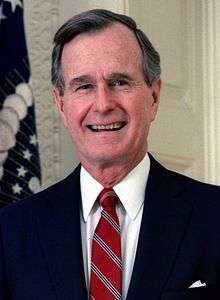Republican Party presidential primaries, 1988
|
| |||||||||||||||||||||||||
| |||||||||||||||||||||||||
| |||||||||||||||||||||||||
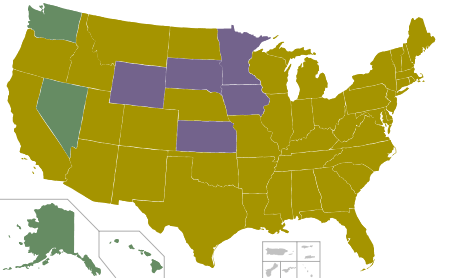 Gold denotes a state won by George H. W. Bush. Green denotes a state won by Pat Robertson. Purple denotes a state won by Bob Dole. Grey denotes a state that did not hold a primary. | |||||||||||||||||||||||||
| |||||||||||||||||||||||||
The 1988 Republican presidential primaries were the selection process that Republican voters used to choose their nominee for President of the United States in the 1988 U.S. presidential election. Incumbent Vice President George H.W. Bush was selected as the nominee through a series of primary elections and caucuses culminating in the 1988 Republican National Convention held from August 15 to August 18, 1988, in New Orleans, Louisiana.
Primary race
Vice President George H. W. Bush had the support of President Ronald Reagan and pledged to continue Reagan's policies, but also pledged a "kinder and gentler nation"[1] in an attempt to win over some more moderate voters. Bush faced some prominent challengers for the GOP nomination, despite his front-runner status.
At the start of the primary election season in early 1988, televangelist Pat Robertson's campaign was attacked because of a statement he had made about his military service. In his campaign literature, he stated he was a combat Marine who served in the Korean War. Other Marines in his battalion contradicted Robertson's version, claiming he had never spent a day in a combat environment. They asserted that instead of fighting in the war, Robertson's primary responsibility was supplying alcoholic beverages for his officers. (See Education and military service).
Robertson's campaign got off to a strong second-place finish in the Iowa caucuses, ahead of Bush. Robertson did poorly in the subsequent New Hampshire primary, however, and was unable to be competitive once the multiple-state primaries like Super Tuesday began. Robertson ended his campaign before the primaries were finished. His best finish was in Washington, winning the majority of caucus delegates. However, his controversial win has been credited to procedural manipulation by Robertson supporters who delayed final voting until late into the evening when other supporters had gone home. He later spoke at the 1988 Republican National Convention in New Orleans and told his remaining supporters to cast their votes for Bush, who ended up winning the nomination and the election. He then returned to the Christian Broadcasting Network and has remained there as a religious broadcaster.
Bush unexpectedly came in third in the Iowa caucus (that he had won back in 1980), behind the winner Senator Bob Dole, and Robertson. Dole was also leading in the polls of the New Hampshire primary, and the Bush camp responded by running television commercials portraying Dole as a tax raiser, while Governor John H. Sununu stumped for Bush. These efforts enabled the Vice President to defeat Dole and gain crucial momentum. Embittered by his loss in New Hampshire, Dole told Bush directly, on live television that evening, to "stop lying about my record."[2]
Once the multiple-state primaries began, Bush's organizational strength and fundraising lead were impossible for the other candidates to match, and the nomination was his. The Republican party convention was held in New Orleans, Louisiana. Bush was nominated unanimously.
In his acceptance speech, Bush made an energetic pledge, "Read my lips: No new taxes", a comment that would come to haunt him in the 1992 election.
Candidates
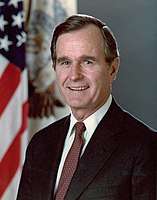
Vice President
George H.W. Bush
Senate Minority Leader
Bob Dole
of Kansas
(Withdrew Mar. 29[3])
(Endorsed George Bush)
Televangelist
Pat Robertson
of Virginia
(Withdrew May 16)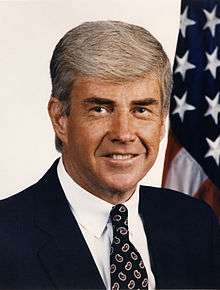
.jpg)
Former Governor
Pierre S. du Pont, IV
of Delaware
(Withdrew Feb. 18)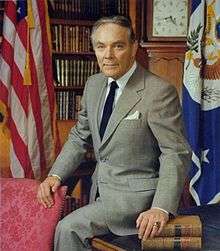
Former U.S. Secretary of State
Alexander Haig
(Withdrew Feb. 12[4])
(Endorsed Bob Dole).jpg)
Former U.S. Senator
Paul Laxalt
of Nevada
(Withdrew Aug. 26, 1987)
Former Governor
Harold E. Stassen
of Minnesota
Endorsements
George H. W. Bush
- President Ronald Reagan (announced May 12, 1988)
- Former Senator and 1964 Presidential nominee Barry Goldwater of Arizona[5]
- Reverend Jerry Falwell[5]
- Texas Governor Bill Clements[6]
- Representative Bob Dornan of California[7]
Bob Dole
- Senator Strom Thurmond of South Carolina[5]
- Former Governor of Texas John Connally[8]
- Former Secretary of State and former presidential candidate Alexander Haig
Jack Kemp
- House Minority Whip Trent Lott of Mississippi[5]
- Representative Newt Gingrich of Georgia
Results
Statewide
| Date | State | George H.W. Bush | Bob Dole | Pat Robertson | Jack Kemp | Pete du Pont |
|---|---|---|---|---|---|---|
| January 14 | Michigan | 57% | 3% | 22% | 17% | 0% |
| February 4 | Hawaii | 9% | 9% | 82% | 0% | 0% |
| February 7 | Kansas | 0% | 99% | 0% | 0% | 0% |
| February 8 | Iowa caucus | 19% | 37% | 25% | 11% | 7% |
| February 16 | New Hampshire | 38% | 29% | 9% | 13% | 10% |
| February 18 | Nevada | 27% | 22% | 15% | 13% | 1% |
| February 23 | Minnesota | 11% | 43% | 28% | 15% | 0% |
| February 23 | South Dakota | 19% | 55% | 20% | 5% | 1% |
| February 24 | Wyoming | 23% | 46% | 11% | 7% | 2% |
| February 28 | Maine | 64% | 8% | 14% | 2% | 0% |
| March 1 | Alaska | 24% | 20% | 49% | 7% | 0% |
| March 1 | Vermont | 49% | 39% | 5% | 4% | 2% |
| March 5 | South Carolina | 49% | 21% | 19% | 11% | 0% |
| March 8 | Alabama | 65% | 16% | 14% | 5% | 0% |
| March 8 | Arkansas | 47% | 26% | 19% | 5% | 1% |
| March 8 | Florida | 62% | 21% | 11% | 5% | 1% |
| March 8 | Georgia | 54% | 24% | 16% | 6% | 0% |
| March 8 | Kentucky | 59% | 23% | 11% | 3% | 0% |
| March 8 | Louisiana | 58% | 18% | 18% | 5% | 1% |
| March 8 | Maryland | 53% | 32% | 6% | 6% | 1% |
| March 8 | Massachusetts | 59% | 26% | 5% | 7% | 1% |
| March 8 | Mississippi | 66% | 17% | 13% | 3% | 0% |
| March 8 | Missouri | 42% | 41% | 11% | 4% | 0% |
| March 8 | North Carolina | 45% | 39% | 10% | 4% | 0% |
| March 8 | Oklahoma | 37% | 36% | 21% | 5% | 0% |
| March 8 | Rhode Island | 65% | 23% | 6% | 5% | 1% |
| March 8 | Tennessee | 60% | 22% | 13% | 4% | 0% |
| March 8 | Texas | 64% | 14% | 15% | 5% | 0% |
| March 8 | Virginia | 53% | 26% | 14% | 5% | 1% |
| March 8 | Washington | 24% | 26% | 39% | 8% | 0% |
| March 15 | Illinois | 55% | 36% | 7% | 1% | 1% |
| March 29 | Connecticut | 71% | 20% | 3% | 3% | 0% |
| April 4 | Colorado | 76% | 0% | 10% | 0% | 0% |
| April 5 | Wisconsin | 82% | 8% | 7% | 1% | 0% |
| April 19 | New York | 100% | 0% | 0% | 0% | 0% |
| April 26 | Pennsylvania | 79% | 12% | 9% | 0% | 0% |
| May 3 | District of Columbia | 88% | 7% | 4% | 0% | 0% |
| May 3 | Indiana | 80% | 10% | 7% | 3% | 0% |
| May 3 | Ohio | 81% | 12% | 7% | 0% | 0% |
| May 10 | Nebraska | 68% | 22% | 5% | 4% | 0% |
| May 10 | West Virginia | 77% | 11% | 7% | 3% | 0% |
| May 17 | Oregon | 73% | 18% | 8% | 0% | 0% |
| May 24 | Idaho | 81% | 0% | 9% | 0% | 0% |
| June 7 | California | 83% | 13% | 4% | 0% | 0% |
| June 7 | Montana | 73% | 19% | 0% | 0% | 0% |
| June 7 | New Jersey | 100% | 0% | 0% | 0% | 0% |
| June 7 | New Mexico | 78% | 10% | 6% | 0% | 0% |
| June 14 | North Dakota | 93% | 0% | 0% | 0% | 0% |
Nationwide
Popular vote results:[5]
- George H. W. Bush - 8,253,512 (67.90%)
- Bob Dole - 2,333,375 (19.19%)
- Pat Robertson - 1,097,446 (9.02%)
- Jack Kemp - 331,333 (2.72%)
- Unpledged - 756,990 (4.48%)
- Pierre S. du Pont IV - 49,783 (0.41%)
- Alexander M. Haig - 26,619 (0.22%)
- Harold Stassen - 2,682 (0.01%)
Running mate
After Bush locked up the nomination in March, conventional wisdom leaned toward the notion of a Southern running mate to balance the ticket. The former Governor of Tennessee, Lamar Alexander, was seen by many as the most logical choice, and some early reports described him as Bush's personal preference.[9][10] Another high-profile possibility, also from Tennessee, was the former Senate Majority Leader and White House Chief of Staff Howard Baker. Despite the early attention – which included a supportive editorial written by former President Richard Nixon – Baker told the press he would prefer to be left out of consideration.[11]
Bush's running mate, however, would not be revealed until August 16, allowing speculation to intensify all the way to the national convention. Bob Dole, who was considered a leading contender based on his second-place finish in the primaries, expressed impatience with the wait but nonetheless made plain his keen desire for the job.[12] So too did Jack Kemp, who confidently told reporters that he would make "a terrific campaigner and a terrific candidate and a terrific vice president".[12] Both men were thought to rank high on Bush's list of potential picks.[13]
Other highly rated prospects included two people quite close to Dole. His wife, Elizabeth Dole, had served as Transportation Secretary under President Reagan and was a popular figure among conservatives and women – two key demographics that Bush was struggling to galvanize. A second option was Dole's fellow U.S. Senator from Kansas, Nancy Kassebaum.[13] Other figures who were believed to be under Bush's close consideration included the Governor of Nebraska Kay Orr,[10] the former Governor of Pennsylvania Dick Thornburgh, the Governor of New Jersey Tom Kean, and the sitting U.S. Senators Bill Armstrong of Colorado, Pete Domenici of New Mexico, and Richard Lugar and Dan Quayle, both of Indiana.[12][13]
U.S. Senator Alan Simpson of Wyoming was also widely believed to be a possible selection, but he publicly stated that he wasn't interested in the position. This placed him in the company of Baker and others who had declared that they did not want to be considered, such as the Governor of California George Deukmejian and the Governor of Illinois Jim Thompson. Shortly ahead of the convention, however, Bush reopened speculation about all of them when he implied that he would not necessarily give up on any demurring prospects.[12]
Long-shot possibilities included several Republicans who were popular in their home states but held limited name recognition nationally, such as U.S. Representative Lynn Martin of Illinois, the Governor of South Carolina Carroll Campbell, and the two U.S. Senators of Missouri, John Danforth and Christopher Bond.[13] Nontraditional selections who were seen as credible alternatives included the National Security Advisor Colin Powell,[14] the former UN Ambassador Jeane Kirkpatrick, Education Secretary William Bennett, former EPA Administrator William Ruckelshaus, and even Supreme Court Justice Sandra Day O'Connor.[13] In 2015, Donald Trump claimed that Bush adviser Lee Atwater asked him to consider the position, but added that the discussion "never really went much further than that".[15][16]
Bush announced his selection of 41-year-old Dan Quayle on the second day of the convention.[17]
See also
References
- ↑ "George H.W. Bush: 1988 Republican National Convention Acceptance Address". American Rhetoric. Aug 18, 1988.
- ↑ Dillin, John (February 18, 1988). "Even with win, Bush seen to be vulnerable". Christian Science Monitor. p. 1.
- ↑ O'Toole, James (30 March 1988). "Dole leaves race, urges keeping GOP in the White House". Pittsburgh Post-Gazette. Retrieved 10 January 2012.
- ↑ Clifford, Frank (13 February 1988). "Haig Drops Out of GOP Race, Endorses Dole". Los Angeles Times. Retrieved 20 July 2016.
- 1 2 3 4 5 Our Campaigns - US President - R Primaries Race - Feb 01, 1988
- ↑ "Clements: Bush will win South". The Galveston Daily News. Galveston, TX. AP. March 1, 1988. Retrieved October 22, 2016 – via Newspapers.com.

- ↑ "Nomination Bush Pres Candidate, Aug 17 1988 (Video)". C-Span. August 17, 1988. Retrieved 27 October 2017.
- ↑ "Dole gains Connally endorsement". The Galveston Daily News. Galveston, TX. AP. February 27, 1988. Retrieved October 22, 2016 – via Newspapers.com.

- ↑ "Magazine: Alexander likely Bush running mate". The Greenville News. Greenville, SC. Associated Press. March 15, 1988. Retrieved May 9, 2017 – via Newspapers.com.

- 1 2 Evans, Rowland; Novak, Robert (March 14, 1988). "Bush's choice for a woman vice president". Muncie Evening Press. Muncie, IN. Retrieved May 9, 2017 – via Newspapers.com.
The vice president's aides say his personal choice for running mate undoubtedly would be former Governor Lamar Alexander....

- ↑ "Who will join Bush on ticket?". Santa Cruz Sentinel. Santa Cruz, CA. Associated Press. March 29, 1988. Retrieved May 9, 2017 – via Newspapers.com.

- 1 2 3 4 Nothberg, Donald M. (August 16, 1988). "V.P. candidates wait to hear from Bush; some campaign". The Morning Call. Allentown, PA. Associated Press. Retrieved May 9, 2017 – via Newspapers.com.

- 1 2 3 4 5 Straight, Harry (August 7, 1988). "Bush's list crowded for No. 2 slot". The Orlando Sentinel. Orlando, FL. Retrieved May 9, 2017 – via Newspapers.com.

- ↑ Nelson, W. Dale (August 12, 1988). "Powell as Bush VP? It's not just a joke". The Palm Beach Post. Palm Beach, FL. Associated Press. Retrieved May 10, 2017 – via Newspapers.com.

- ↑ Meacham, Jon (2015). Destiny and Power: The American Odyssey of George Herbert Walker Bush (illustrated ed.). Random House. p. 326. ISBN 1400067650.
- ↑ Bradner, Eric. "Trump says Bush 41 adviser approached him about becoming VP". CNN. Retrieved 30 August 2018.
- ↑ "Bush Picks Sen. Quayle of Indiana as Running Mate". The Los Angeles Times. Los Angeles, CA. Associated Press. August 16, 1988. Retrieved May 9, 2017 – via Newspapers.com.

